新概念第二册40课课件
合集下载
新概念英语第二册第40课课件
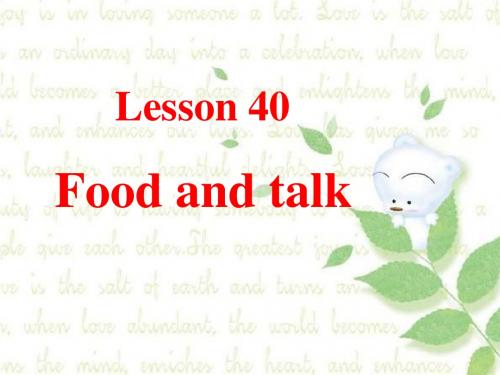
对将来的愿望
对过去的愿望
would/ might/ could+动词原形
过去完成时
I wish (that) I were a bird. I wish (that) I could fly.
I wish (that) I had forgotten it.
2.用于表示命令、建议、要求等一类词后面的宾语从句。 insist, order, command, suggest, advise, propose, require, request, demand, decide 等 We suggested that the meeting (should) be put off. They insisted that the boy (should) go with them. 注意:suggest 当表示“暗示、表明“讲时,insist 表示”坚持认为“之意时,应用陈述语气。 The smile on his face suggested that he was satisfied with our work.
想迫使对方做出明确答复时,将来进行时可以 显得比一般将来时will更委婉客气。
3. Last week at a dinner party, the hostess asked me to sit next to Mrs. Rumbold. 介词at通常用于小型集体活动之前,比较大型的活动会用介词in。 at a meeting(在会议上);at a concert(在音乐会上);at a wedding(在婚礼上)等等。 4. Mrs. Rumbold was a large, unsmiling lady in a tight black dress. unsmiling的反义词是smiling(微笑的,喜气洋洋的)。有些形容 词前面可以加上前缀un-l来表示相反的意思,比如: comfortable-uncomfortable;true-untrue;interesting- uninteresting等等。 5. She did not even look up when I took my seat beside her. Take a seat和take one’s seat都表示“让某人坐下”,这种用 法要比sit down更加正式。 by/beside是贴近的旁边;而near是有一段距离的附近。所以,句 子中的beside可以用by互换
新概念英语第二册lesson40课件共25张PPT

3. If I ______ you, I ______ more attention to English idioms
and phrases.
A. was; shall pay
B. am; will pay
C. would be; would pay D. were; would pay
4. —Alice, why didn’t you come yesterday? —I ______, but I had an unexpected visitor. A. had B. would C. was going to D. did
① v. 使……固定、安装 fix the picture on the wall She fixed a handle on the door. ② v. 修理 fix on使(目光、注意力等)集中于,盯着 fix one's eyes on sth./ one's eyes be fixed on sth.盯着……目不转睛 All the eyes were fixed on the blackboard.
2).If he had taken my advice,he would not have made such a mistake. 如果他听我的劝告的话,就不会犯这样的错误了。(事实:没有听我的话)
Exercises:
1. I don’t think that I shall fail. But if I ______, I would try again. A. should fail B. would fail
2.Mrs. Rumbold was a large, unsmiling lady in a tight black dress. unsmiling adj. 不笑的 unsmiling的反义词为 smiling 有些形容词前面可以加上前缀un-来表示相反的意义:
新概念英语第二册Lesson40foodandtalk课件
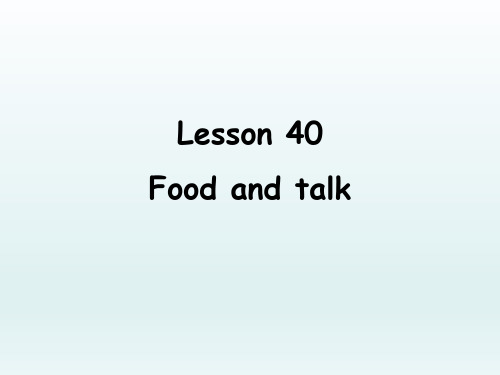
6. spend your holiday abroad 去国外度假
‘In despair, I asked her whether she was enjoying her dinner.’ 7. in despair 失望
Focus on grammar
1. If you park your car in the wrong place, a traffic policeman will soon find it.
句则推测想象的结果。 与现在事实相反的虚拟条件句 结构: if从句------一般过去时(be用were) 主句-------过去将来时(would/could/might/should+do) eg: If you ate more and talked less, we would both enjoy our dinner. If I were you, I would not go to the party.
overcoat.
A. But
B. Although C. How
D. What
Fill in the blanks 1
Food and talk Last week at a dinner party, the _h_o_s_te_s_s___ asked me to sit next to Mrs. Rumbold. Mrs. Rumbold was a large, _u_n_s_m_il_in_g__ lady in a __t_ig_h_t__ black dress. She did not even look up when I took my seat beside her. Her eyes were __f_ix_e_d__on her plate and in a short time, she was busy eating. I tried to make conversation. 'A new play is coming to "The __G_lo_b_e__" soon,' I said. 'Will you be seeing it?' 'No,' she answered. 'Will you be spending your holidays abroad this year?' I asked 'No,' she answered. 'Will you be staying in England?' I asked. 'No,' she answered. In _d_e_s_p_ai_r_, I asked her whether she was enjoying her dinner. 'Young man,' she answered, “if you ate more and talked less, we would both enjoy our dinner!"
‘In despair, I asked her whether she was enjoying her dinner.’ 7. in despair 失望
Focus on grammar
1. If you park your car in the wrong place, a traffic policeman will soon find it.
句则推测想象的结果。 与现在事实相反的虚拟条件句 结构: if从句------一般过去时(be用were) 主句-------过去将来时(would/could/might/should+do) eg: If you ate more and talked less, we would both enjoy our dinner. If I were you, I would not go to the party.
overcoat.
A. But
B. Although C. How
D. What
Fill in the blanks 1
Food and talk Last week at a dinner party, the _h_o_s_te_s_s___ asked me to sit next to Mrs. Rumbold. Mrs. Rumbold was a large, _u_n_s_m_il_in_g__ lady in a __t_ig_h_t__ black dress. She did not even look up when I took my seat beside her. Her eyes were __f_ix_e_d__on her plate and in a short time, she was busy eating. I tried to make conversation. 'A new play is coming to "The __G_lo_b_e__" soon,' I said. 'Will you be seeing it?' 'No,' she answered. 'Will you be spending your holidays abroad this year?' I asked 'No,' she answered. 'Will you be staying in England?' I asked. 'No,' she answered. In _d_e_s_p_ai_r_, I asked her whether she was enjoying her dinner. 'Young man,' she answered, “if you ate more and talked less, we would both enjoy our dinner!"
新概念英语第二册Lesson 40 (共53张PPT)
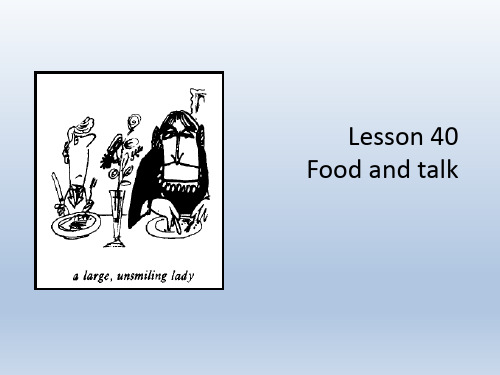
• ask sb to do sth. • 请求sb.做sth.
•
Text
• Mrs. Rumbold was a large, unsmiling lady • in a tight black dress.
• 修饰人外形的口语化形容词(体积) • big/large/huge
Text
• Mrs. Rumbold was a large, unsmiling lady • in a tight black dress.
Lesson 40 Food and talk
本课重点
Words and expressions hostess, unsmiling, tight Grammar 虚拟语气
Introduce the word
• T: Today we'll listen t a story about a man who goes to a dinner party.
• What did you ask her next? • Whether she would be spending her holidays
abroad this year.
WORDS
New words and expressions
New words and expressions
hostess n.
Text
• In despair, I asked her whether she was • enjoying her dinner. •
Text
• In despair, I asked her whether she was • enjoying her dinner. •
Text
•
Text
• Mrs. Rumbold was a large, unsmiling lady • in a tight black dress.
• 修饰人外形的口语化形容词(体积) • big/large/huge
Text
• Mrs. Rumbold was a large, unsmiling lady • in a tight black dress.
Lesson 40 Food and talk
本课重点
Words and expressions hostess, unsmiling, tight Grammar 虚拟语气
Introduce the word
• T: Today we'll listen t a story about a man who goes to a dinner party.
• What did you ask her next? • Whether she would be spending her holidays
abroad this year.
WORDS
New words and expressions
New words and expressions
hostess n.
Text
• In despair, I asked her whether she was • enjoying her dinner. •
Text
• In despair, I asked her whether she was • enjoying her dinner. •
Text
新概念第二册第40课ppt课件

烧伤病人的治疗通常是取烧伤病人的 健康皮 肤进行 自体移 植,但 对于大 面积烧 伤病人 来讲, 健康皮 肤很有 限,请 同学们 想一想 如何来 治疗该 病人
3. Mrs. Rumbold was a large, unsmiling lady in a tight black dress. in在这里表示“穿什么衣服”(第17课学过) : In the play, she must appear in a bright red dress and long black stockings.
Discuss: Which of the following behaviors are polite or impolite at a Western dinner party. Write “P”(polite) or “I”(impolite) in brackets.
( P ) 1 Use the knife with your right hand. (P ) 2 Put your napkin on your lap. (I ) 3 Start eating as soon as your food is served in front of you (I ) 4 Ask for a second bowl of soup. (P ) 5 Use your fingers when eating chicken. (P ) 6 Finish eating everything on your plate. (I ) 7 Talk loudly while eating. ( I ) 8 Make other people drink more than they can take.
(1) 修理 ,相当于repair I must get the radio fixed. 我必须请人把收音机修好。 (2) 使固定 He fixed the picture on the wall. 他把画固定在墙上。 The chair was fixed next to the desk. 椅子被固定在桌子旁边。
新概念第二册第40课课件Lesson40
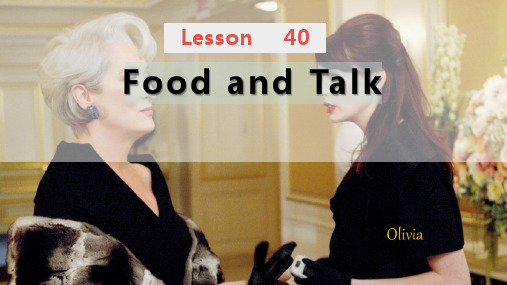
现在
did/were
should/would /could/might do
2-year-old:
If I ___c_o_u__ld_(can) talk, I _w__o__u_l_d__t_e_l_l_(tell) my
mother that I hate peas.
14 year-old:
I __w__o__u_l_d__b_e__(be)
Was Mrs. Rumbold a good companion at dinner?
Last week at a dinner party, the hostess asked me to sit next to Mrs. Rumbold. Mrs. Rumbold was a large, unsmiling lady in a tight black dress. She did not even look up when I took my seat beside her. Her eyes were fixed on her plate and in a short time, she was busy eating. I tried to make conversation.
Lesson 40
Food and Talk
Content
01
Review
02
New Words
03
Grammer
04
Homework
Part 1
hostess
(n)
host (n) 主 guest master (n)主人 servant mistress
unsmiling
smiling (a)微笑的微笑服务 unsmiling (a)不苟言笑的 一个不苟言笑的人
新概念二Lesson 40教师课件
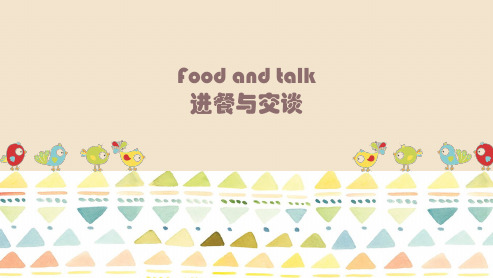
PART TWO
虚拟语气
If 条件状从
与过去相反
与现实相符
与现在相反
与将来相反
If it doesn’t rain tomorrow, we will go on a picnic.
如果明天不下雨,我们就去野餐。
If 引导的条件状从,与现实情况一致,符合 主将从现。
If he had watched this film, he would have known it. 如果他曾经看过这部电影,他就会知道了。
If I had gone to bed earlier, I _w_o__u_l_d__h_a_v_e__b_e__e_n__m__o_r_e__e_n_e_r_g_e__ti_c_.___
If you broke this window, you_w_o__u_ld__h_a__v_e__to___(have to) pay for it.
‘A new play is coming to ”The Globe” soon,' I said. ' Will you be
seeing it? ‘
will be doing 将来进行时,表示
'No,' she answered. 打算做某事,提问比较委婉
'Will you be spending your holidays abroad this year?' I asked.
would/could/should /might + V.(原)
从过应were 主情原
用正确的动词时态填空:
1. He would enjoy this if he__w_e_r_e____(be) present. 2. She can do better if she_t_ri_e_s____(try). 3. If you play with matches, you_w__il_l_b_u_r_n___(burn) your fingers. 4. If you__lo_s__t _(lose) your way, you would have to ask a policeman.
虚拟语气
If 条件状从
与过去相反
与现实相符
与现在相反
与将来相反
If it doesn’t rain tomorrow, we will go on a picnic.
如果明天不下雨,我们就去野餐。
If 引导的条件状从,与现实情况一致,符合 主将从现。
If he had watched this film, he would have known it. 如果他曾经看过这部电影,他就会知道了。
If I had gone to bed earlier, I _w_o__u_l_d__h_a_v_e__b_e__e_n__m__o_r_e__e_n_e_r_g_e__ti_c_.___
If you broke this window, you_w_o__u_ld__h_a__v_e__to___(have to) pay for it.
‘A new play is coming to ”The Globe” soon,' I said. ' Will you be
seeing it? ‘
will be doing 将来进行时,表示
'No,' she answered. 打算做某事,提问比较委婉
'Will you be spending your holidays abroad this year?' I asked.
would/could/should /might + V.(原)
从过应were 主情原
用正确的动词时态填空:
1. He would enjoy this if he__w_e_r_e____(be) present. 2. She can do better if she_t_ri_e_s____(try). 3. If you play with matches, you_w__il_l_b_u_r_n___(burn) your fingers. 4. If you__lo_s__t _(lose) your way, you would have to ask a policeman.
新概念二第40课课件
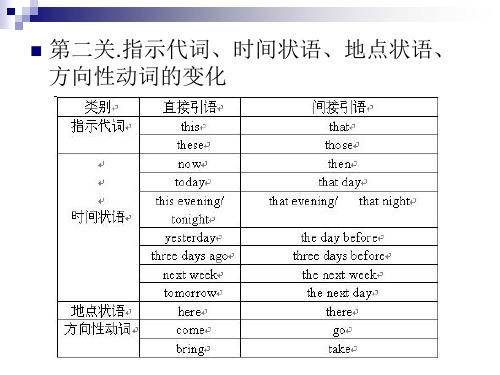
•
•
即将上映
The film will be on. 那部电影即将要上映
• 6、'if you ate more and talked less, we would both enjoy our dinner!‟ • 在并列句中,相同的句子成分(如主语、谓语、状语等) 通常由同一词性的单词/词组表示,并且它们的长度也差 不多,以保持句子的平衡性。 • You can either go out or stay here.
主句(直接引语)是一般现在时,间接引 语时态不变; 主句是一般过去时,间接引语时态要改为 相应的过去时。
第五关:句子结构的变化 直接引语变间接引语时,间接引语要用陈 述句的语序。引导词要放在间接引语的最 前面,接下来按“主谓宾”顺序排列。即: 直接引语转换成间接引语时用陈述语序 He asked Mike, “Where did you go?” He asked Mike where he had gone.
• (inquiring for sb.
• 3、She did not even look up when I took my seat beside her.
• take a seat • 坐下,比sit要正式
Please take a seat.
• take one‟s seat
•
表示位置事先已安排好
sb./sth. is the despair of…
The boy is the despair of his parents. This boy is his mother's despair.
The examination was the despair of me. = The examination was1.Listen to the tape
